- Register
- Log in to Tune-In
- Wishlist (0)
-
Shopping cart
(0)
You have no items in your shopping cart.
Beatles News

According to BeatlesBible.com, the Fab Four had first recorded the song with original drummer Pete Best on June 6, 1962, at London’s EMI Studios — later Abbey Road Studios. Then, after Ringo Starr had replaced Best, the band took a second crack at the song at EMI on September 4 of that year.
Producer George Martin wasn’t happy with the quality of Ringo’s drumming on that version, so The Beatles reconvened once more time at EMI, on September 11, 1962, with session drummer Andy White sitting in and Starr on tambourine.
Initial copies of the “Love Me Do” single actually featured the version with Ringo, although the one with White was included on The Beatles’ debut U.K. album, Please Please Me, and The Beatles’ Hits EP, which were released in 1963 in March and September, respectively.
Source: ABC NEWS/kshe95.com
details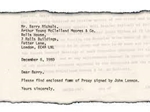
Hours before John Lennon's murder he put pen to paper, for perhaps the final time in his life, and now that document is up for grabs ... to any collector with deep pockets.
The typed letter was personally signed by JL on December 8, 1980 -- the day he was shot and killed outside his NYC home -- and it's believed to be the last legal doc with his autograph.
John sent it to his accountant, Barry Nichols, and it lists 3 people to whom John gave his proxy to vote at an annual meeting for the Beatles corporations ... which was happening 9 days later in London.
This particular memorabilia is expected to fetch between $30k and $50k ... and if it does, that would be a sweet deal considering his last autograph sold for $100k!
Source: tmz.com
details
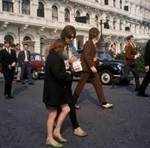
In 1976, George Harrison was in India, and a local journalist set out to interview him — and score an autograph for a friend. After much searching, the journalist, C.Y. Gopinath, managed to track Harrison down. He had no interest in giving an interview, though. When Gopinath asked for his autograph, Harrison responded sourly.
After many exhausting years of touring and recording music, The Beatles took a trip to India to study Transcendental Meditation.
“The weeks the Beatles spent at the ashram were a uniquely calm and creative oasis for them: meditation, vegetarian food and the gentle beauty of the foothills of the Himalayas,” photographer Paul Saltzman wrote, per Rolling Stone. “There were no fans, no press, no rushing around with busy schedules, and in this freedom, in this single capsule of time, they created more great music than in any similar period in their illustrious careers.”
Source: Emma McKee/cheatsheet.com
details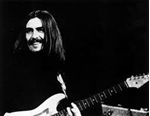
One of the songs from The Beatles‘ The White Album was about a guru John Lennon disliked. George Harrison said he came up with the sexy name of the song. Subsequently, George explained why the original name of the track didn’t work for him.
“I just called him ‘Sexy Sadie,'” he said. “Instead of [singing] ‘Maharishi, what have you done, you made a fool of … ‘ I was just using the situation to write a song, rather calculatingly but also to express what I felt. I was leaving Maharishi with a bad taste.”
According to Rolling Stone, John stopped looking up to the Maharishi because his friend Alex “Magic Alex” Mardas said the guru committed sexual misconduct against a female follower. No lawsuits were ever filed against the spiritual leader. Furthermore, John’s wife, Cynthia Lennon, said her husband hated the Maharishi’s preoccupation with money and fame.
Source: Matthew Trzcinski/cheatsheet.com
details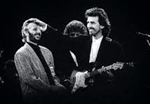
Ringo Starr became famous drumming for The Beatles, but he didn’t rest on his laurels when they disbanded. He kicked off a modestly successful acting career before the group broke up, released solo records steadily since the 1970s (aside from a semi-retirement in the 1980s), and toured with several iterations of his All-Starr Band. Ringo and fellow Beatle George Harrison remained close enough that the drummer shared some incredible final moments with his one-time bandmate. Still, even though Ringo repeatedly asked George to join his All-Starr Band, the guitarist essentially refused in the most George way possible.
Source: Jason Rossi/cheatsheet.com
details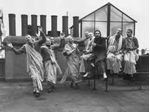
A couple of years after legendary sitarist Ravi Shankar gave him the tools to start his spiritual journey, George became friends with the members of the Hare Krishna Temple, whose guru was Bhaktivedanta Swami, a.k.a. Prabhupada.
George met Shyamsundar, a devotee of the Haight-Ashbury temple, at The Beatles’ Christmas party in 1969. He told George he and the other devotees were living in a warehouse in Covent Garden and hoped to establish a temple in London.
Suddenly, George made it his mission to help them. He produced their album The Radha Krishna Temple and published Prabhupada’s KRSNA Book. After everything George did for them, the devotees made sure never to ask George for help again.
Source: Hannah Wigandt/cheatsheet.com
details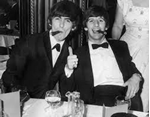
George Harrison once joked that his fellow Beatle, Ringo Starr, “might be a yogi disguised as a drummer.” The pair were close during their time with the Fab Four.
In Here Comes The Sun: The Spiritual And Musical Journey Of George Harrison, Joshua M. Greene wrote that when The Beatles broke up, George was sad about not being bandmates with John Lennon, Paul McCartney, and especially Ringo.
“Of course, they would remain close, communicate, see each other from time to time,” Greene wrote. “How could it be otherwise? They’d built a rapport that was nearly ‘telepathic,’ as Ringo had once described it.
“Of the three, George knew, Ringo could always be counted on for good humor and affection. Ringo would always be there for him. ‘For all I know,’ he said, ‘Ringo might be a yogi disguised as a drummer.'”
Source: Hannah Wigandt/cheatsheet.com
details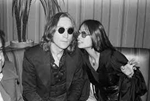
In 1973, John Lennon and Yoko Ono temporarily separated, and he began dating the couple’s assistant, May Pang. Over the course of their relationship, she witnessed Lennon’s relationships with his former Beatles bandmates. She was there for some explosive fights, including one between Lennon and George Harrison. She explained that the ferocity of Harrison’s anger was frightening, even to Lennon.
After separating from Ono in 1973, Lennon moved out of the couple’s apartment. Ono has said that the separation, and Lennon’s subsequent relationship with Pang, did not hurt her.
“The affair was not something that was hurtful to me,” Ono told The Telegraph in 2012. “I needed a rest. I needed space.”
Lennon refers to the separation period as his “Lost Weekend,” though, in reality, it lasted roughly 18 months. While he was creatively productive, he also drank heavily and used drugs, sometimes leading to destructive behavior. During this time, he was involved with Pang.
Source: Emma McKee/cheatsheet.com
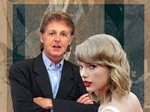
Paul McCartney songs inspired Taylor Swift’s “Lover.” Swift discussed how Paul’s music regularly inspires her in the studio.
“Lover” lasted a long time on the charts in the United States.
Taylor Swift‘s “Lover” took inspiration from the instrumentation of Paul McCartney songs. Subsequently, producer Jack Antonoff revealed what he thought about the track’s bassline. Notably, the song performed differently in the United States and the United Kingdom.During a 2019 interview with Rolling Stone, a journalist told Swift her album Lover sounded like independent music. “That’s amazing, thank you,” she replied. “It’s definitely a quirky record. With this album, I felt like I sort of gave myself permission to revisit older themes that I used to write about, maybe look at them with fresh eyes.
Source: Matthew Trzcinski/cheatsheet.com
details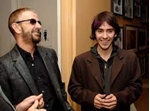
George Harrison‘s son, Dhani, could’ve had his father’s fellow Beatle, Ringo Starr, teach him the drums. If you want to learn, you have to learn from the best. However, it didn’t exactly go to plan.
When Dhani was little, George never pushed music or his famous band on him. However, he didn’t exactly hide what he did for a living, either. All Dhani knew was that his father “pushed buttons” for a living, which was what George and his wife, Olivia, wanted. They tried raising him out of the spotlight.
When his father’s famous friends came to call, it was nothing out of the ordinary. Dhani would sit with them for hours in the recording studio as they made songs.
“I hung out with my parents. I was always trying to be with the big kids, and the big kids at my house were like (ELO frontman) Jeff Lynne,” Dhani told Daily Mail. “You’d come home and it was like, ‘Bob Dylan’s here.’ It’s hard to get a bit of perspective on, like, ‘How did your school test go today?'”
Source: Hannah Wigandt/cheatsheet.com

Rare photos of The Beatles performing in their early days at Liverpool's Cavern Club have been discovered.
The images were taken in 1961, a year before their debut single Love Me Do was released.
The photos show Sir Paul McCartney and John Lennon singing, with George Harrison on guitar and a partly-obscured original drummer Pete Best.
Historian Mark Lewisohn described them as "whippet-thin under-nourished lads" following their tour to Germany.
The band, who were then aged between 18 and 20, had recently returned from performing in Hamburg, where they had been "slogging 500 stage hours in 90 days", he said.
"So slender has this marathon made them, it's as if their heads and bodies are stranger.
Source: BBC News
details
Ringo Starr has fond memories of making The Beatles’ Abbey Road despite the band’s status as the time. Intraband fighting had the Fab Four on the verge of shattering for good, but the group pulled together and made a rare album — one whose reputation seems to continue growing nearly 55 years later. Ringo said some of his strongest memories from making Abbey Road are of the band playing together again, but he admitted he has a more selfish reason for loving those sessions.Ringo once called “Rain” a weird Beatles song because he never played a beat like that. He also laid down a performance for the ages on “Tomorrow Never Knows,” but Abbey Road was Ringo’s shining moment.
Source: Jason Rossi/cheatsheet.com
details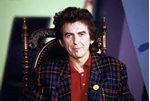
Eric Idle said he needed to see George Harrison on his deathbed in 2001. Otherwise, he would’ve regretted not seeing his friend one last time. The comedian wasn’t George’s only friend who felt that way.
Idle and George became friends in the 1970s. They met at a Monty Python and the Holy Grail screening, smoked pot in the projection room, went to dinner, then the recording studio, and proceeded to talk for the next 48 hours. They bonded over their similar roles in their respective groups.
Idle said it was love at first sight between them. Later, George helped Idle and Monty Python produce Life of Brian, allowing the friends to collaborate. The pair remained friends who were there for each other. After George’s 1999 home invasion, Idle was at his side immediately.
Source: Hannah Wigandt/cheatsheet.com
details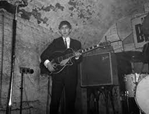
George Harrison said he didn’t enjoy his singing in The Beatles. He didn’t sing too much because John Lennon and Paul McCartney hardly allowed him to come forward with his songs. However, George’s singing wasn’t as bad as he thought. He was often overly critical of himself.
When George was a teenager, John Lennon and Paul McCartney asked him to join The Quarryman, later The Beatles. Like all teenage boys, George’s voice was changing, getting deeper. When The Beatles started their residency in Hamburg, Germany, George was still only 17 years old.
During the band’s all-night performances, John, Paul, and George sang anything and everything to get an audience to stick around. Then, when they started their residency at The Cavern Club, the band continued to be pros on stage.
Source: Hannah Wigandt/cheatsheet.com
details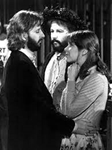
Ringo Starr’s great drumming and affable personality earned him a place in the musical pantheon, but even legends misfire from time to time. On his third album Ringo, Starr included a cover of the song “You’re Sixteen.” The content of this song wasn’t as glaringly problematic when it was released, but the notion of an adult man signing about the beauty of an adolescent girl only gets creepier with time. The incorporation of a young Carrie Fisher into the promotion of the song is also uncomfortable, given the significant difference in age between her and Starr. Released in 1973, Ringo is a notable record for several reasons. It is one of the few occasions where all four of the Beatles collaborated on the same project, albeit on different songs. It was also the commercial peak of Starr’s solo career.
Source: cheatsheet.com
details